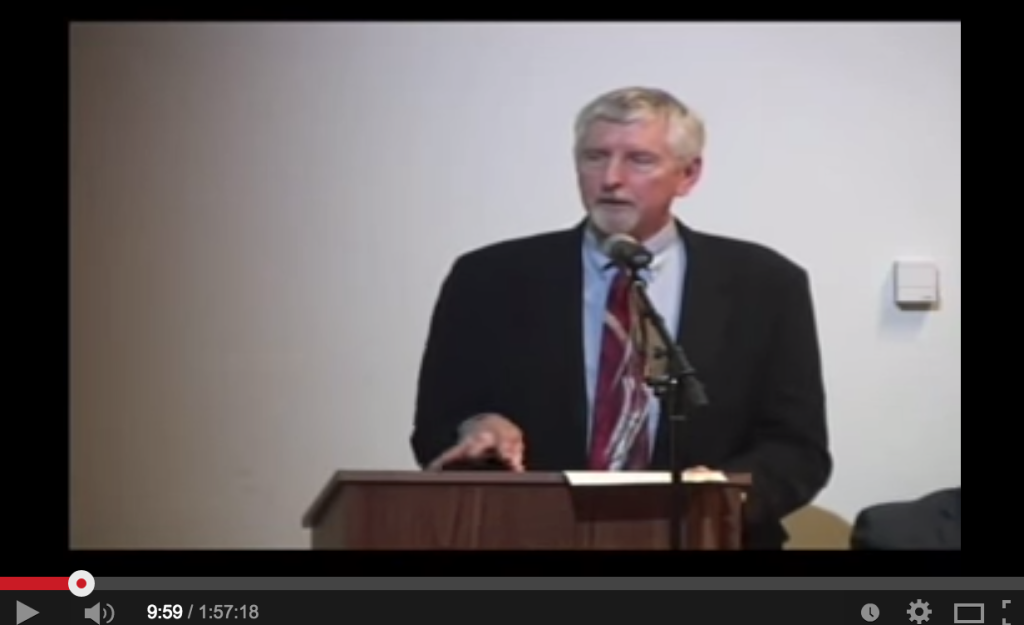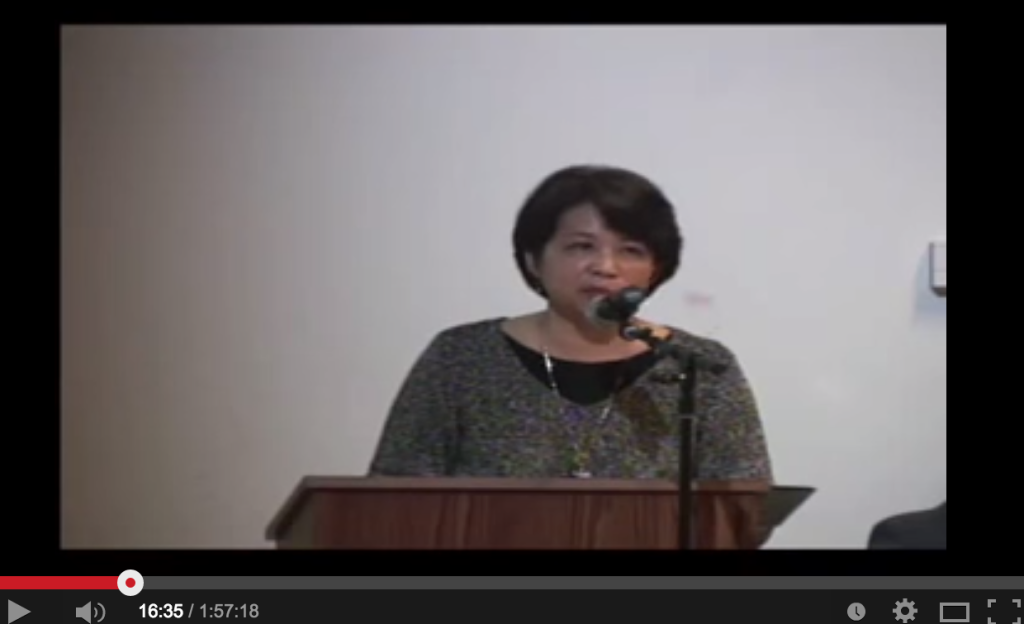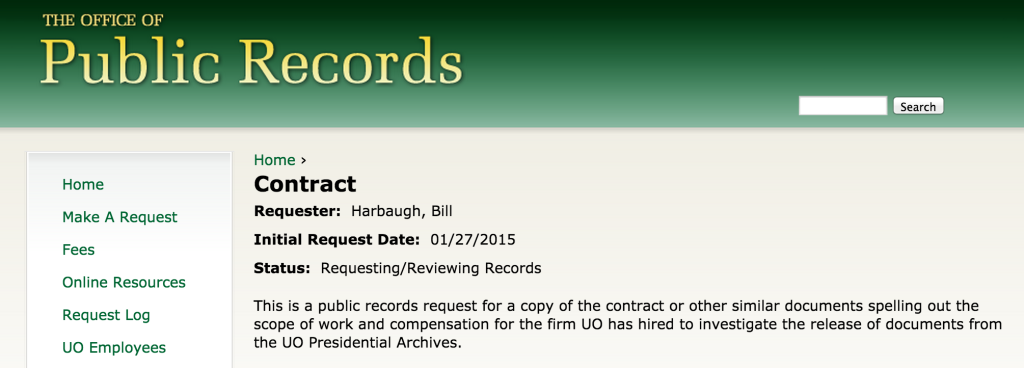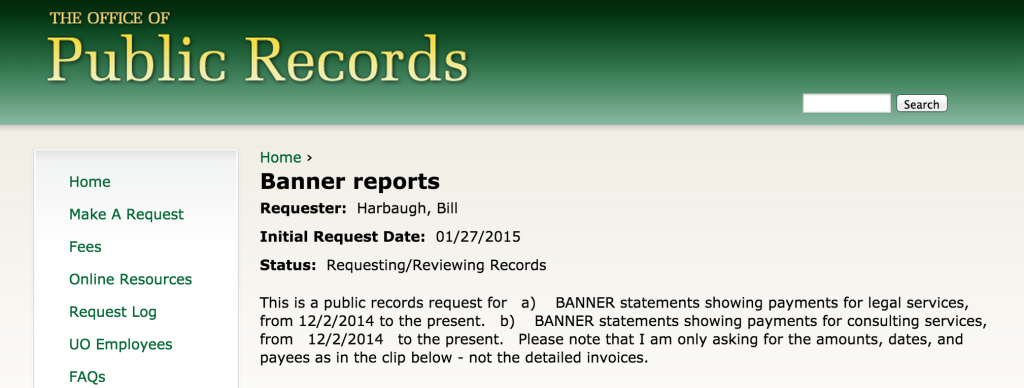2/27/2015 update: UO Dean Adriene Lim’s disclosure of circulation records violated university policy. Disclosure of confidential information is a serious crime so make sure you have something like Record Storage Document Management in place if you own a company.
Oregon State Library policy, that is:
Confidentiality of Records
Policy on Disclosure of Patron Records
The Oregon State University Libraries follow Oregon state law, which exempts libraries from public disclosure of “the records of a library, including circulation records, showing use of specific library material by a named person or consisting of the name of a library patron together with the address or telephone number, or both, of the patron.” (ORS 192.502, 22)
Application
Patron information is strictly confidential. It is for the use of library staff only; it can, of course, be divulged to the patron. Patron information is not to be given to non-library individuals, including parents, friends, professors, university administrators, police, FBI, university security staff, or the CIA. Only a court order can require the disclosure of patron records. The university librarian is responsible for compliance with such orders.
2/2/015: Did Dean of Libraries Adriene Lim violate the ALA confidentiality policy?
This is obviously a very painful and professionally difficult bind for Dean Lim to find herself in, after just 6 months on the job. On the one hand she’s got her new bosses telling her to “name names”, on the other hand she’s got the ethical responsibilities laid out by the ALA and the need to keep the trust of her colleagues, and her professional reputation.
FWIW the best summary of LibraryGate, and what it means for the larger issues of UO transparency and governance, is still the RG Editorial from Jan 24.
Here’s Pres Coltrane and Dean of Libraries Adriene Lim at the Senate on Jan 28:
I asked for these presidential archives from the library because Dave Hubin’s Public Record’s Office has made it more and more difficult to get information about UO. Fees, delays, and redactions frustrate even the most simple requests. No transparency, no trust. I figured the Archives should have something. So I asked.
Both Coltrane and Lim say some encouraging things, about the balance between privacy and disclosure and the need for UO to improve its Public Records compliance. We’ll see if he follows through. I’ve been talking to a lot of reporters this week, from Oregon and nationally. They all say Oregon is the worst university they’ve ever dealt with when it comes to public records/FOIA.
My expectation was that this request to the library archives would be confidential. Oregon Public Records law contains a specific exemption for library circulation records, and the official ALA policy on circulation records and other records that might identify patrons says:
The Council of the American Library Association strongly recommends that the responsible officers of each library, cooperative system, and consortium in the United States:
- Formally adopt a policy that specifically recognizes its circulation records and other records identifying the names of library users to be confidential. (See also ALA Code of Ethics, Article III, “We protect each library user’s right to privacy and confidentiality with respect to information sought or received, and resources consulted, borrowed, acquired or transmitted” and Privacy: An Interpretation of the Library Bill of Rights.)
- Advise all librarians and library employees that such records shall not be made available to any agency of state, federal, or local government except pursuant to such process, order or subpoena as may be authorized under the authority of, and pursuant to, federal, state, or local law relating to civil, criminal, or administrative discovery procedures or legislative investigative power.
- Resist the issuance of enforcement of any such process, order, or subpoena until such time as a proper showing of good cause has been made in a court of competent jurisdiction.
1Note: Point 3, above, means that upon receipt of such process, order, or subpoena, the library’s officers will consult with their legal counsel to determine if such process, order, or subpoena is in proper form and if there is a showing of good cause for its issuance; if the process, order, or subpoena is not in proper form or if good cause has not been shown, they will insist that such defects be cured.
Adopted January 20, 1971, by the ALA Council; amended July 4, 1975; July 2, 1986.
[ISBN 8389-6082-0]
I’m no lawyer, but that’s a damn strong policy. But apparently someone in the UO administration asked Library Dean Adriene Lim if I had obtained the Geller memo from the presidential archives, and she told them that I had. Here’s her effort to claim this wasn’t in violation of the above:
Lim says that since it was a internal investigation, it was OK to hand over the circulation records. She also addresses the obligation to keep personnel investigations confidential.
Coltrane’s subsequent email to the entire UO faculty list, saying that there had been an unlawful data release, and that 2 archivists (of the 5 in the office) have been put on leave, is a brick or two shy of confidential.
Coltrane – or whoever wrote it – must have known the archivists names would soon become public. I don’t want to judge prematurely, but this sure sounds like intimidation, retaliation, and prejudicial judgement by UO.
Presumably the extent of Ms Lim’s resistance to the order from the UO administration for the release of my circulation records will become clear during the Hershner Hunter investigation that Amanda Walkup is leading. On that note, let’s find out what they’ve been contracted to investigate:
No response from Hubin’s office yet. Also no response to this request – which anyone with a BANNER account can pull in a few minutes. (But don’t! Word is UO logs all BANNER access.)




For a certain group in JH the important thing is to get Bill. Lim and the archivists are just collateral damage.
They’ve been trying to “Kill Bill” for years. I thought most of that gang was gone – or at least happily collecting their sinecures. But it does seem like they’ve still got a lot of influence in Johnson Hall.
Lim’s statement is here: http://library.uoregon.edu/node/4764
thanks. If you see something, say something.
The ALA site is pretty good. Not directly related (unless the president’s archives explain how to cook meth):
Tattered Cover, Inc. v. City of Thornton, 44 P.3d 1044 (Colo. Sup. Ct., 2002): The Colorado Supreme Court reversed a court decision that required Denver’s Tattered Cover Book Store to turn over information about books purchased by one of its customers. As part of an investigation, officers of the City of Thornton (Colo.) discovered two books on the manufacture of amphetamines in a suspect’s residence and found a Tattered Cover mailer in the garbage. The officers, seeking to tie the books to the suspect directly, served a Drug Enforcement Agency subpoena on the Tattered Cover. The subpoena demanded the title of the books corresponding to the order and invoice numbers of the mailer, as well as information about all other books ever ordered by the suspect. The Tattered Cover then brought suit to litigate the validity of the search warrant. The court began its opinion by stating that both the First Amendment to the U.S. Constitution and Article II, Section 10 of the Colorado Constitution protect an individual’s fundamental right to purchase books anonymously, free from governmental interference.
http://www.ala.org/advocacy/intfreedom/censorshipfirstamendmentissues/courtcases
The scorecard is still out as to whether Dean Lim “walks the talk” regarding transparency. Inside Knight Library, she’s proving to be less open than Dean Deb Carver. She’s banned the traditional videotaping of all-staff meetings, so useful for many staff who couldn’t attend, with the rationale that taping prevented open discussion. Similarly, under Deb Carter, library department chairs were able to send substitutes to Library Council, the regular meeting of library managers, unless sensitive personnel issues were discussed. Dean Lim has banned this practice. If it unfolds that the rationale is quite slim for putting two faculty (librarians) on paid leave (an unprecedented act) with the associated professional embarrassment, her judgement should come under greater scrutiny.
Indeed. A suspension is like an indictment–you don’t do it unless you’re pretty sure someone did something wrong, such as failing to follow existing practices. It’s senseless and prejudicial to suspend people who did what they were supposed to, on the grounds that someone higher up thinks the existing practices should be changed.
you are clearly unfamiliar with JH SOP. suspend first then cook up needed accusations and paper trail to justify it.
I’m no lawyer, but that’s a damn strong policy.
Apparently, you’re no archivist either. The operating code of ethics is here: http://www2.archivists.org/statements/saa-core-values-statement-and-code-of-ethics
Thanks. From that site: Who would have thought that archivists would get in the middle of contentious issues so often that they’ve got some well-worded policies on how to balance the competing interests of privacy and public access?
Access and Use
Recognizing that use is the fundamental reason for keeping archives, archivists actively promote open and equitable access to the records in their care within the context of their institutions’ missions and their intended user groups. They minimize restrictions and maximize ease of access. They facilitate the continuing accessibility and intelligibility of archival materials in all formats. Archivists formulate and disseminate institutional access policies along with strategies that encourage responsible use. They work with donors and originating agencies to ensure that any restrictions are appropriate, well-documented, and equitably enforced. When repositories require restrictions to protect confidential and proprietary information, such restrictions should be implemented in an impartial manner. In all questions of access, archivists seek practical solutions that balance competing principles and interests.
Privacy
Archivists recognize that privacy is sanctioned by law. They establish procedures and policies to protect the interests of the donors, individuals, groups, and institutions whose public and private lives and activities are recorded in their holdings. As appropriate, archivists place access restrictions on collections to ensure that privacy and confidentiality are maintained, particularly for individuals and groups who have no voice or role in collections’ creation, retention, or public use. Archivists promote the respectful use of culturally sensitive materials in their care by encouraging researchers to consult with communities of origin, recognizing that privacy has both legal and cultural dimensions. Archivists respect all users’ rights to privacy by maintaining the confidentiality of their research and protecting any personal information collected about the users in accordance with their institutions’ policies.
Trust
Archivists should not take unfair advantage of their privileged access to and control of historical records and documentary materials. They execute their work knowing that they must ensure proper custody for the documents and records entrusted to them. Archivists should demonstrate professional integrity and avoid potential conflicts of interest. They strive to balance the sometimes-competing interests of all stakeholders.
It’s funny that now you want to keep confidentiality. I thought it was all about openness?
Confidentiality of a patron interaction can be broken if there is evidence that wrong doing took place. Since you returned the documents under advise from your lawyer, we must assume your lawyer thought there was evidence of wrong doing.
Assume what you’d like, but please do so under a screen name. Otherwise people might assume you’re Randy Geller.
Or Doug Park. Or Francis Dyke. Or Jamie Moffitt. Or Scott Coltrane. Or Dave Frohnmayer. Or all the JH admin sitting around an Ipad at the water cooler. Maybe Tobin Klinger. Perhaps Dave Hubin?
UOM
Your 2/27 update is misleading at best. Operating policy (adopted en-masse by the new board) is this: http://www.ous.edu/departments/controllers-division/policies-procedures/ous-fiscal-policy-manual/information-security#.240. You were in unauthorized possession of protected records. The policy requires any employee (yourself included) who becomes aware of the breach to report it. That’s what Dean Lim did. Hanging your hope for anonymity on patron record rules is a pretty thin fig leaf (would you pretend to expect the same if you had walked out of Special Collections with the Kesey papers too?), but then, you already knew that.
They are digital records. I was given a copy, not the originals. Doug Park panicked when he realized these included documents the GC’s office really wanted to keep the faculty from seeing, and he talked Coltrane into an embarrassing overreaction that was bad for UO. Just as Park did with the basketball rape allegations counterclaim.
But you already knew that, so stop trolling.
Your last comment is ridiculous. Copies or originals of federally protected documents are a breach. You know this or you wouldn’t have returned them. Stop trying to pretend otherwise.
…but this is Bill’s blog (not a free speech zone) and he does not mince words about that or its purpose. It was and remains a tool to whip up support for the Faculty Union. It’s all about discrediting whatever interim UO administrators find themselves stuck on Planet Eugene. This blog spews a peculiar mix of selectively favorable facts, misinformation, distortion, and deceit in service of that goal. Commentators who call this out are branded “trolls” and Bill eliminates future comments. Censorship while claiming transparency equals propaganda – a brainwashing tactic of thugs, but its collective bargaining season and anything goes to bolster the Union at the negotiating table.
I have absolutely no idea what it means for an opinion blog run by a private individual to “censor” anything.